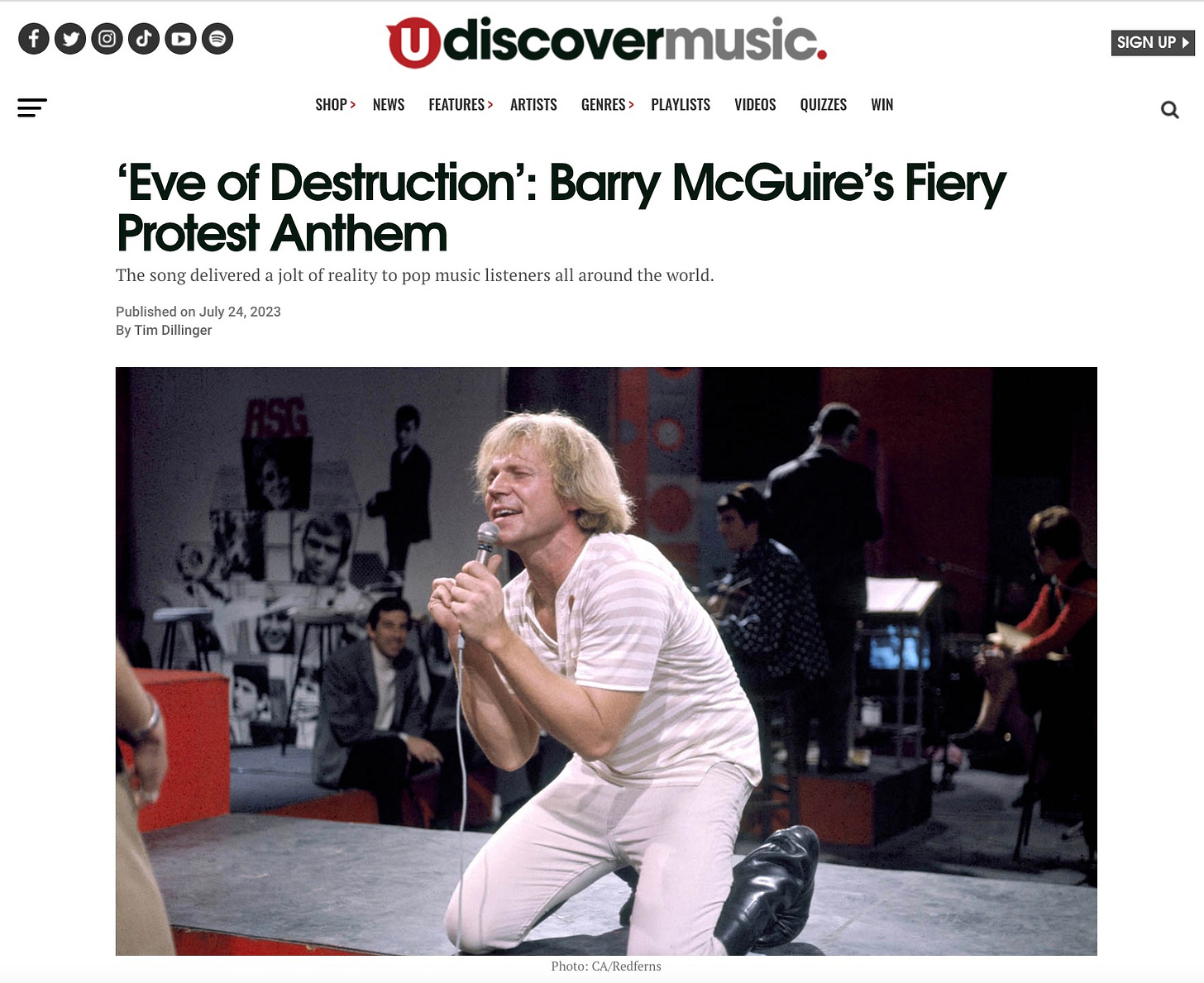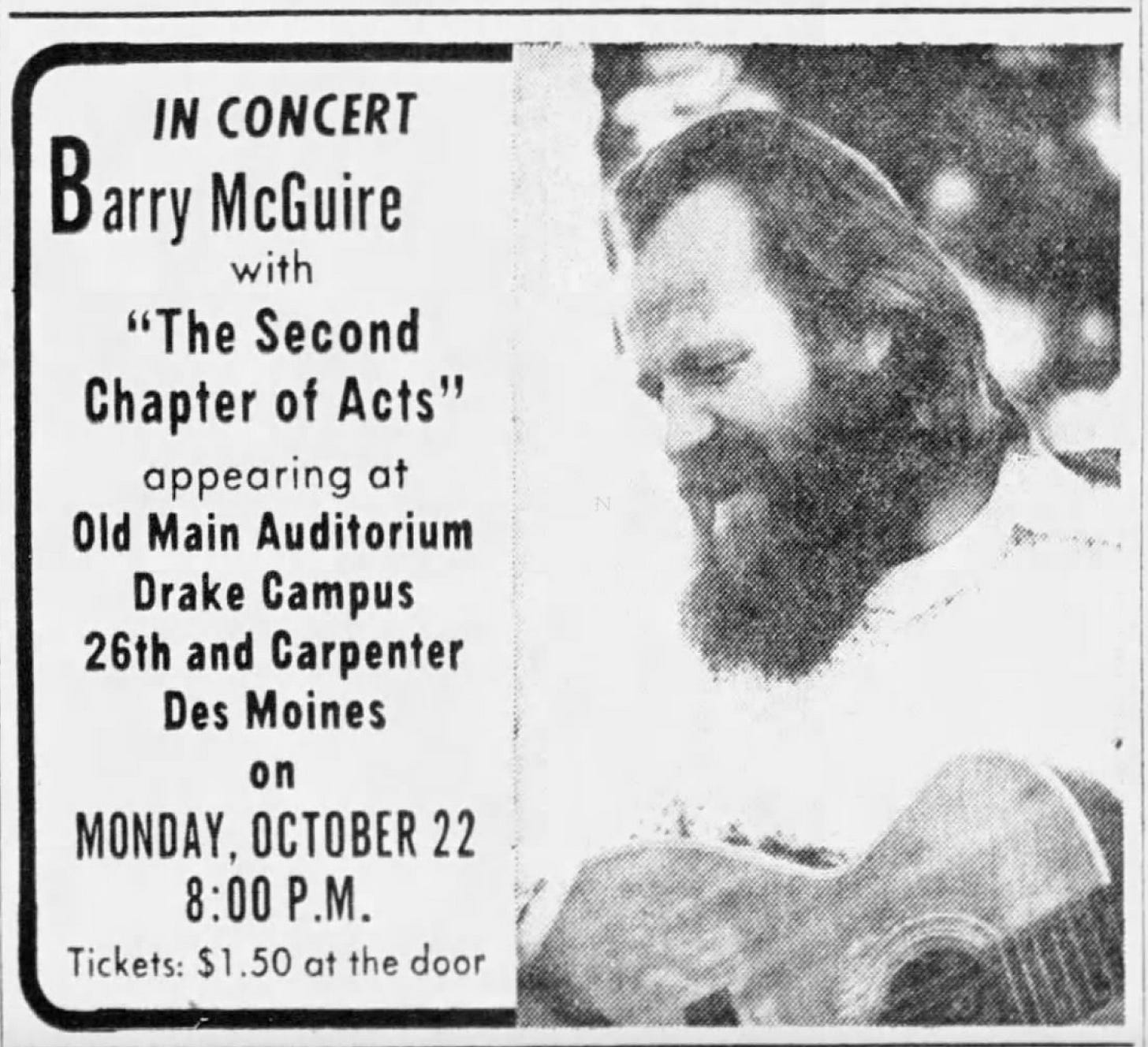The CCM Works of Barry McGuire
The singer who made "Eve of Destruction" a counterculture anthem had a subsequent life in The Jesus Movement.
This past week, UDiscoverMusic asked me to craft an article chronicling the story of Barry McGuire’s “Eve of Destruction,” a song written by P.F. Sloan that went to #1 on Billboard’s Hot 100 in 1965, amid a flurry of controversy which included radio bans and, according to McGuire, FBI surveillance. You can read it here!
Getting to write about Barry McGuire was an exciting prospect for me. As a child, my introduction to his music was in contemporary Christian music. His song “Bullfrogs and Butterflies,” from the children’s musical of the same name, was inescapable, something I had to sing in both Sunday School productions and elementary school productions.
But I became more deeply interested in McGuire’s career after seeing him in the First Love recording in the late 90s, a reunion of the Jesus Music artists. I was struck by his sincerity and joy and realized that I needed to be more acquainted with his work.
After “Eve of Destruction” hit number 1 in 1965, McGuire starred in the first Broadway production of Hair, and, soon after, found himself in the throes of an existential crisis. “I thought Hair was great. I felt it was a statement of the ultimate truth, the real liberation. But after a year on Broadway, I realized I had been sucked into the big vacuum and was just another Broadway ripoff. So I left.”1
An encounter with cross-carrying evangelist Arthur Blessitt on the streets of Hollywood brought McGuire into the burgeoning Jesus Movement and within months he was writing and performing songs at high schools, public parks, beaches and college campuses. He told one newspaper, “God is pulling people of all faiths together. Doctrinal discrepancies and theological opinions are succumbing to the simple love of Jesus Christ.”2
He performed his signature song, “Eve of Destruction” at Explo ‘72, often seen as the pinnacle moment of the Jesus Movement, and a year later released his first CCM album, Seeds, on Word’s Myrrh Records. His early albums and performances were augmented by backing vocals from the 2nd Chapter of Acts, who were rising to fame in their own right with songs like “Easter Song” and “Which Way The Wind Blows.”
McGuire’s career in CCM grew throughout the seventies, earning a Grammy nomination for 1978’s Cosmic Cowboy, an ethereal concept album that took four years to develop. But as CCM became more formalized and commercially focused, McGuire’s recording output began to slow down. In the eighties, he released only two albums of original material, but continued to tour…and think. In a 1983 interview he said, “The reason Christ is the last one to be examined is because of Christianity. I speak of Christendom. Church organizations are good things, but the actual thing is the relationship with Christ.”3
McGuire returned to his folk roots in the 90s and toured and recorded until his retirement at the age of eighty-five, just two years ago. As I researched Barry, I came across this interview on YouTube that I found incredibly moving and insightful. He sings “Eve of Destruction,” “Cosmic Cowboy,” and (yes!) Madonna’s “Frozen,” and shares his thoughts about the contemporary church.
“I want to be a source-r. A source-r has no agenda. You’re just a portal. [On the other hand], a sorcerer is someone who uses the gospel to build his own kingdom, to build his own agenda, his own denomination, his own networks, systems, wheeling and dealing for God.”
If you are a free subscriber, I encourage you to upgrade to a paid subscription for $8 a month if you’d like to support the archival and narrative work that I am doing. You can also contribute via the GoFundMe for the New York Community Choir book or via CashApp.
I’m grateful to each of you for the ways you are helping to spread the word about my work!
Mauldin, Tom, ‘Hair Singer Finds the Lord,’ The Corning Daily Observer, May 21, 1974, pg. 1
Wynn, Pat, ‘Barry McGuire Is Singing A New Song,’ The Idaho Statesman, Nov. 11, 1972, pg. 6
Vander Velden, Pat, ‘Pop Singer Rejects Labels,’ The Oshkosh Northwestern, Oct. 27, 1983, pg. 4







What a story! And who better to understand it and tell it!